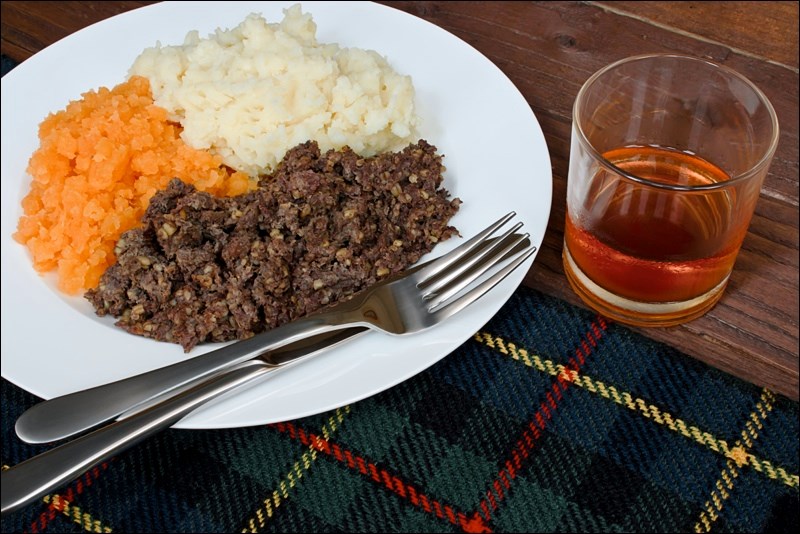This Saturday, Flin Flonners will gather to eat haggis, recite poetry, and sing Scottish songs as part of a global tradition that memorializes a well-loved Scottish poet, Robert, or “Robbie” Burns.
Voice of the people
Robert Burns was born in Ayrshire, Scotland on January 25, 1759. The son of a self-educated tenant farmer, Burns began writing poetry as a boy. In 1786, Burns published his first collection of poems, entitled “Poems, Chiefly in the Scottish Dialect,” now known as the Kilmarnock Edition. Burns published the book in order to raise the funds he needed to move to Jamaica, where he had been offered a job as a bookkeeper on a slave plantation. To Burns’ own surprise, his poems were acclaimed by literary critics and common folk alike.
Burns decided to remain in Scotland, and went on to become one of the most celebrated figures in the country, beloved for his skill as a poet in both English and the Scottish dialect, and for his ability to capture the experiences of everyday people. In addition to his poetry, Burns produced a great number of songs, many of which were adapted versions of Scottish folk songs. Auld Lang Syne is the most widely-known of these.
Tradition lives on
Robbie Burns passed away in 1796, at the age of 37. The tradition of the Robbie Burns supper developed in the early 1800s, as a way to keep Burns’ words and memory alive. More than 200 years later, Robert Burns’ birthday is a national holiday in Scotland, and an unofficial holiday for fans of his poetry,
and ex-pat Scots, around the world.
Each year, Robbie Burns clubs gather together for a special supper which is heavy on Scottish traditions, full of poetry and song, and usually enlivened by generous servings of whiskey.
Elly Spencer, who now lives in Flin Flon, was born in Scotland. She and her husband Tim have long celebrated her roots by hosting small Robbie Burns suppers at their home with friends.
Last year, the Spencers decided to expand the scope of the event, hosting a larger Robbie Burns night at Johnny’s Social Club. “It was very successful…everyone had a great time,” says Spencer, “so we decided to do it again, because we needed a fundraiser for the community choir.”
This year Spencer, along with a team of volunteers, will bring Robbie Burns night to life with a 70-person supper at Johnny’s Social Club. Funds raised from the $20/person ticket sales will go towards the Flin Flon Community Choir’s upcoming production of Les Miserables.
As Spencer explains, Robbie Burns suppers vary in formality, and this event will be less formal than most, but there are a number of traditions which will be incorporated into the evening.
The supper will begin with a local bagpiper, Rod Walker, “piping in” the haggis. Haggis, considered the national dish of Scotland, is a type of sausage made from a sheep’s stomach. It is filled with diced sheep’s liver, lungs and heart, oatmeal, onion, suet and seasoning. Burns’ poem “Address to a Haggis,” written in 1787, elevated the status of this traditional dish. Murray MacDonald will recite the humorous poem at the beginning of the evening, and will also lead a toast to the immortal memory of Robert Burns.
The highlight of the night for many will be the Scottish supper, which will include haggis, made by Spencer herself, along with “neeps” (turnips) as well as shepherd’s pie, oatcakes and other specialties prepared by volunteer cooks.
The evening will be filled with the reciting of poetry, and performances of Scottish and Celtic songs, including those written or adapted by Robert Burns.
“Everyone is supposed to get involved,” explains Spencer. “We’re not going to be putting it on like a show…we will be calling people up out of the audience to participate, and anyone who wants to recite can just let us know, and we’d be happy to have them.”
In Spencer’s family, American singer-songwriter Hank Williams was always on the program on Robbie Burns’ birthday.
“We would sing Robert Burns for a while, then everyone had to sing Hank Williams songs,” says Spencer. “My grandmother thought that Hank Williams was the American equivalent to Robbie Burns.” That tradition will likely continue this weekend, as Flin Flon celebrates Burns’ 256th birthday.
His poetry still resonates
Over 200 years after Robbie Burns’ death, the poet remains a beloved figure in Scotland, and around the world. When asked why Burns’ appeal has endured, Spencer points to his politics.
“He was a socialist, born before the last big Scottish revolution against the English. He was the son of a farmer, and he always had to work, but he was smart – he wrote incredible political poems and he was the first poet to write in the dialect that people spoke. Common people understood it.
“He wrote poems about what people were experiencing…and they still stand up today. The power of his poetry still resonates,” says Spencer.
In an article titled “The People’s Poet,” published in The Guardian newspaper in 2008, Scottish writer Andrew O’Hagen explores his own fascination with Burns: “I love his Scottish words and rhythms - I hear them in my sleep - and I feel I know the very flowers and skies and muddy smears of his landscapes. But the facility of address that makes Burns great relies on a skill that language and rhythm alone cannot manage: what he
possesses, for all the perfection of accent and precision of speech,
is a quality of empathy that radiates from everything touched by his imagination.”
Tickets for Robbie Burns Night are available at The Orange Toad.




